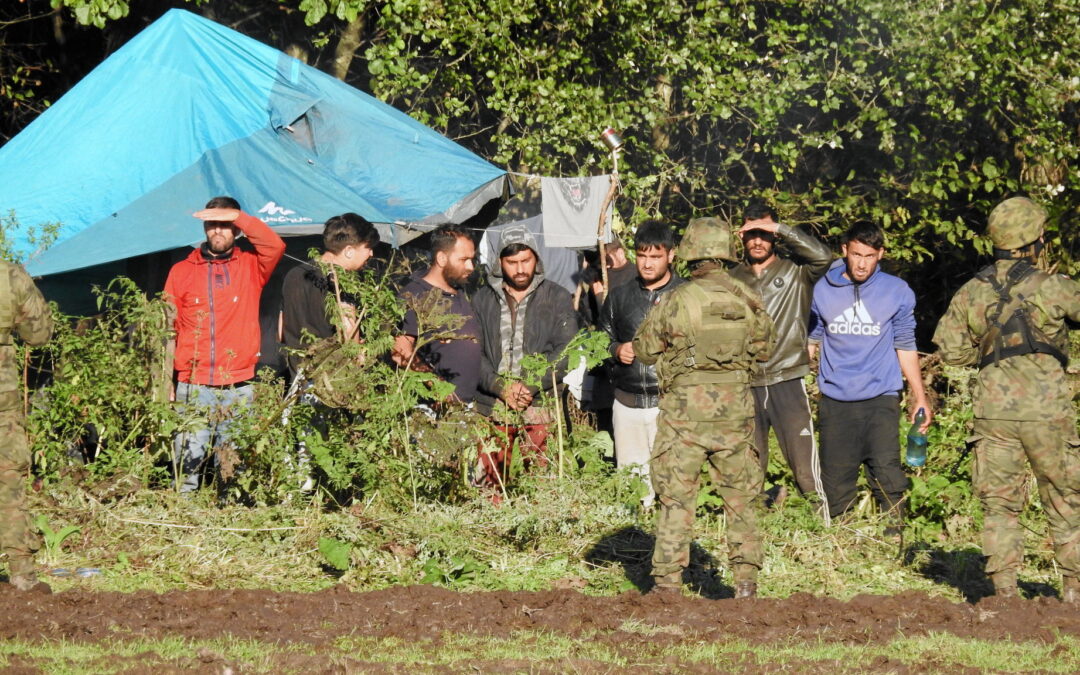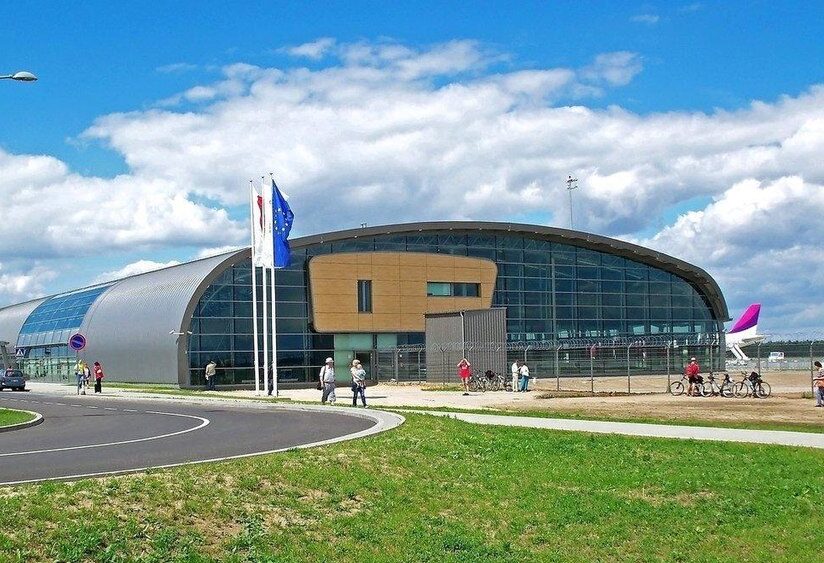By Aleksandra Pulchny
A humanitarian crisis is taking place on the Polish-Belarusian border. For some time, foreigners, including citizens of Iraq, Afghanistan, Syria and Yemen as well as African countries, have been reaching Poland at various points on its border with Belarus. Since August, however, attempted crossings have increased significantly .
This is the result of a deliberate campaign by the Belarusian authorities in response to sanctions imposed on the Lukashenko regime by European Union countries. Minsk is organising transport for foreigners or making this travel easier by readily providing Belarusian visas, offering to take them to the EU. After arriving legally in Belarus, they are transported by that country’s authorities to the border and forced to cross it.
What actions are the Polish border guard taking?
Initially, the Polish border guard detained foreigners who had crossed the border and applied to place them in detention centres for foreigners .
However, as numbers rose to unprecedented levels, there were growing reports from NGOs, legal groups, media outlets and some opposition MPs – based on on-the-ground reporting and accounts from migrants – that some border crossers were being detained and then sent back into Belarus. On 20 August, the interior minister issued a decree permitting border guards to return people who have made illegal crossings to the border.
Poland's border guard has confirmed for the first time that it is sending people who have crossed illegally from Belarus back over the border.
A spokeswoman told Dutch TV that they "return them to the border". Asked if these are pushbacks, she said "yes" https://t.co/42bLeb9MAG
— Notes from Poland 🇵🇱 (@notesfrompoland) September 21, 2021
Since the beginning of September, it has become extremely different to know what is happening on the border because the president – at the request of the government and with the approval of parliament – has introduced a state of emergency there.
Non-resident civilians are now prohibited from visiting the area and it is not permitted to make recordings or take photos of the border, meaning that media, NGOs and others are unable to be present, let alone document what is happening. Simultaneously, the Polish army has begun building a razor-wire fence on the border to foil future attempts to cross.
While the government argues that the state of emergency is a necessary response to the crisis – which it says has been engineered by Belarus as part of a “hybrid war” against the EU – critics say it is intended precisely to prevent scrutiny of the government’s actions there.
At the same time, near the Polish village of Usnarz Górny a group of around 30 Afghans has for weeks been in a makeshift camp on the Belarusian side of the border, prevented from entering Poland by Polish border guards but apparently unable or unwilling to go back into Belarus.
The UN refugee agency and Poland’s commissioner for human rights have argued that Poland has an obligation to let the group cross, as they have declared a desire to seek asylum. Whether they are entitled to should be determined following the relevant procedure by the Foreigners Office. But a Polish deputy minister has already described the groups as “economic migrants”.
An interim measure last month by the European Court of Human Rights (ECHR) compelled Poland to ensure that the group receive aid. However, as it does not require Poland to let them cross the border, the Polish authorities have argued that it would be unlawful to unilaterally pass aid to people on Belarusian territory. It has also sought to prevent activists and politicians from doing so.
The Polish government did send a convoy of aid for the Afghans by road, but says that Belarus has refused to let it cross the border.
At the beginning of September, the Polish Red Cross managed to work with their Belarusian counterparts and the UNHCR in Belarus to supply the refugees with humanitarian aid. Currently, owing to the state of emergency, the situation of these people is unknown to the outside world.
Meanwhile on 19 September the bodies of four foreigners were found on the territory of Poland. Media reports indicate that at least one of them died of hypothermia.
Are the migrants entitled to apply for asylum?
The behaviour of the people with whom NGOs have had contact suggests that when crossing the border they wanted to lodge an application for international protection in Poland. Some people have even managed to give Polish lawyers power of attorney to represent them in this procedure, and those being held near Usnarz Górny also declared this desire to the border guards supervising them.
According to Polish and international law, such an oral declaration of the desire to apply for asylum should be sufficient for an officer to commence the procedure of granting international protection.
Furthermore, taking into account the general situation in the countries of origin of people recently crossing the border (especially those from Afghanistan, Syria and Iraq), it can be assumed to be necessary to check whether they should be granted asylum. Only by allowing them into Polish territory can their individual situation be assessed in terms of abidance by human rights in their homelands.
The practice of “push-backs”, i.e. forcing people applying for international protection out of Poland, is not new. In past years, NGOs have informed of frequent cases of people declaring a wish to apply for international protection at the border in Terespol not being admitted.
The difference here is that those people were arriving at official border crossings, which is practically impossible for the people arriving now. Firstly, it is the Belarusian authorities that decide where they cross. Secondly, even if the foreigners did manage to reach an official border control, with current practice and migration policy they find it difficult to be allowed into Poland.
Last year, the ECHR ruled that Poland had violated the rights of Chechen asylum seekers by unlawfully ignoring their applications for international protection when turning them away as part of widespread practice at the Terespol border crossing.
Since the people who unsuccessfully try to apply for asylum do not figure as a separate group in official records, it is impossible to give a precise estimate of the scale of this phenomenon. Statistics on refusals of entry, however, suggest that we are talking about thousands of people. In 2018 alone, between September and December, just 110 out of 1,239 attempts to cross the border in Terespol were successful.
What is the legal status of foreigners at the border?
The Polish government argues that the border guard is fulfilling its obligation to prevent foreigners from illegally crossing the border. Although states have the sovereign right to regulate the entry of foreign citizens, international law (binding in Poland) states that measures taken to this end may not prevent anyone from applying for international protection.
The border guard is obliged to receive an application for international protection, even when a foreigner illegally attempts to cross the border. The principle of non-refoulement applies in Poland. This prohibits countries from any actions resulting in a foreigner being returned to a dangerous foreign territory, including a ban on refusing to accept people declaring persecution at the border or not admitting them to the country.
This prohibition also results from ECHR case law and national laws, including the Polish constitution, which guarantees the right to apply for asylum in Poland. Foreigners crossing the border are obliged to possess valid documents entitling them to enter Poland (including a passport and visa), but this does not apply to people seeking international protection.
What is the government’s solution?
In response to the current unlawful actions of the authorities on the eastern border, the Polish government is working on a change to the asylum law to reflect the plan to admit the fewest possible refugees into Poland.
The draft legislation seeks to remove people without any of the procedural guarantees offered by the previous system and to make it possible to ignore an application for international protection in such situations as those on the Polish-Belarusian border today.
Also, as mentioned above, the interior minister has issued a decree – which the border guard is invoking – permitting them to return people making illegal crossings to the border. These changes to the law are an attempt to legitimise unlawful push-backs in Poland that violate the Geneva Convention and EU law.
Is Belarus a safe country?
In the context of pushing refugees back across the border, the question arises whether they could not stay in Belarus and apply for protection there. Both human rights organisations and EU states, including Poland, agree that Belarus is an authoritarian country which does not abide by freedoms, regularly violates human rights, and infringes the international standards of a democratic state.
The lack of appropriate access to an asylum procedure in Belarus was also noted by the ECHR in the case concerning the Polish border guard ignoring refugee applications at the border in Terespol.
It is also significant that, owing to the desperate situation in Belarus, citizens of this country are currently the largest group receiving asylum in Poland. Polish agencies say that merely applying for protection in Poland can be regarded as a reason for repression in Belarus – which also demonstrates the official Polish view of the state of respect for human rights in Belarus.
The number of asylum claims in Poland rose 27% in the first half of this year, driven in particular by Belarusians fleeing their homeland.
Since last August, 100% of completed asylum claims from Belarusians have been approved by Poland https://t.co/XQatnnanaw
— Notes from Poland 🇵🇱 (@notesfrompoland) July 21, 2021
What about those allowed into Poland?
Refugees who have recently managed to enter Poland are usually placed in detention centres for foreigners on the basis of criminal procedure laws. Families with children are also taken there. These centres resemble prisons, with bars on the windows and occupants unable to leave freely and visits limited.
Lately, as these detention centres have filled up, more have been created, while new rules have reduced the minimum area per person from four to two square metres. This is less than the standard in prisons, which is no less than three square metres.
By law, victims of violence – which many of the people seeking asylum are – may not be held in detention centres. Despite this prohibition, on numerous occasions lawyers providing legal aid in centres and the human rights commissioner have said that they have met victims of violence there, often with visible marks or scars.
However, there has usually been no reaction from the authorities, although the border guard should routinely check whether a foreigner staying in a detention centre might have faced violence.
What might be the legal consequences for Poland?
The current events on the border could result in Poland facing further cases from the ECHR concerning violations of the prohibitions on collective expulsion of aliens and on torture and other inhuman or degrading treatment.
In the latter case, the grounds for Poland’s liability could be expulsion of foreigners to Belarus, which, ECHR case-law shows, will not guarantee them appropriate access to an asylum procedure and will send them to their country of origin.
Translated by Ben Koschalka
Main image credit: Agnieszka Sadowska/ Agencja Gazeta





















